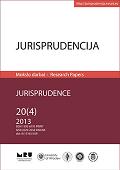The Best Interests of the Child Always Come First: The Brussels Ii Bis Regulation and the European Court of Justice
The Best Interests of the Child Always Come First: The Brussels Ii Bis Regulation and the European Court of Justice
Author(s): Koen LenaertsSubject(s): Law, Constitution, Jurisprudence
Published by: Mykolas Romeris University
Keywords: European Union; Private International Law; conflict-of-jurisdiction rules; The 1980 Hague Convention on the Civil Aspects of International Child Abduction; Regulation (EC) No 2201/2003 (the Brussels II bis Regulation); free movement of judgments; legal ce
Summary/Abstract: The purpose of the present contribution is to explore how the European Court of Justice (the ECJ) – in dialogue with national courts – has interpreted the Brussels II bis Regulation concerning jurisdiction and the recognition and enforcement of judgments in matrimonial matters and the matters of parental responsibility. The present paper is divided into four parts. Part 1 looks at the concept of ‘habitual residence’ of the child concerned which is the conflict-of-jurisdiction principle on which the Brussels II bis Regulation is based. In this regard, it is argued that that principle has been construed by the ECJ in such a way as to take account of the best interests of the child. In Part 2, the case law relating to the provisions of the Brussels II bis Regulation on child abduction is studied in great detail. That study shows that the ECJ seeks to interpret the Brussels II bis Regulation in light of the best interests of the child. Part 3 is devoted to examining the way in which the ECJ has interpreted the concept of ‘provisional measures’ which enables national courts to derogate from the conflict-of-jurisdiction principle set out in the Brussels II bis Regulation. In Part 4, the fact that that Regulation calls upon national authorities to cooperate with each other is illustrated by a judgment of the ECJ relating to the cross-border placement of a child. Finally, a brief conclusion supports the contention that the ECJ does not give absolute priority to the mobility of judgments over the protection of fundamental rights. On the contrary, as the case law clearly reveals, the ECJ will never interpret the Brussels II bis Regulation against ‘the best interests of the child’.
Journal: Jurisprudencija
- Issue Year: 20/2013
- Issue No: 4
- Page Range: 1302–1328
- Page Count: 27
- Language: English

